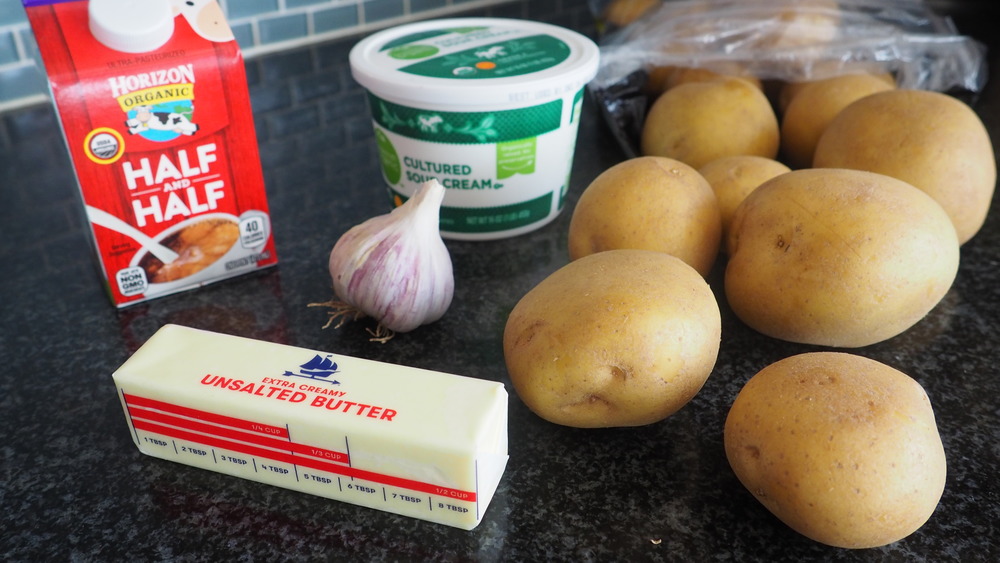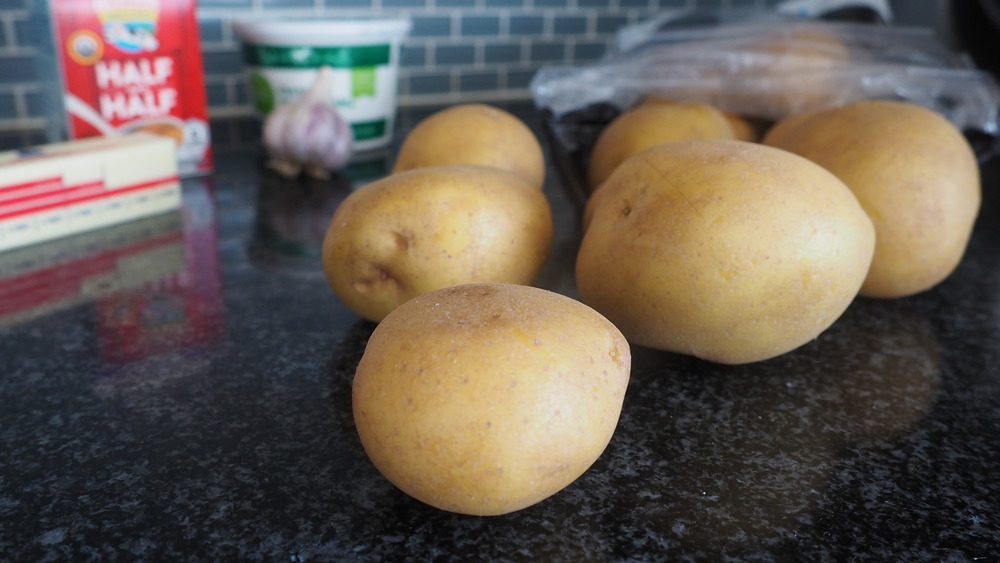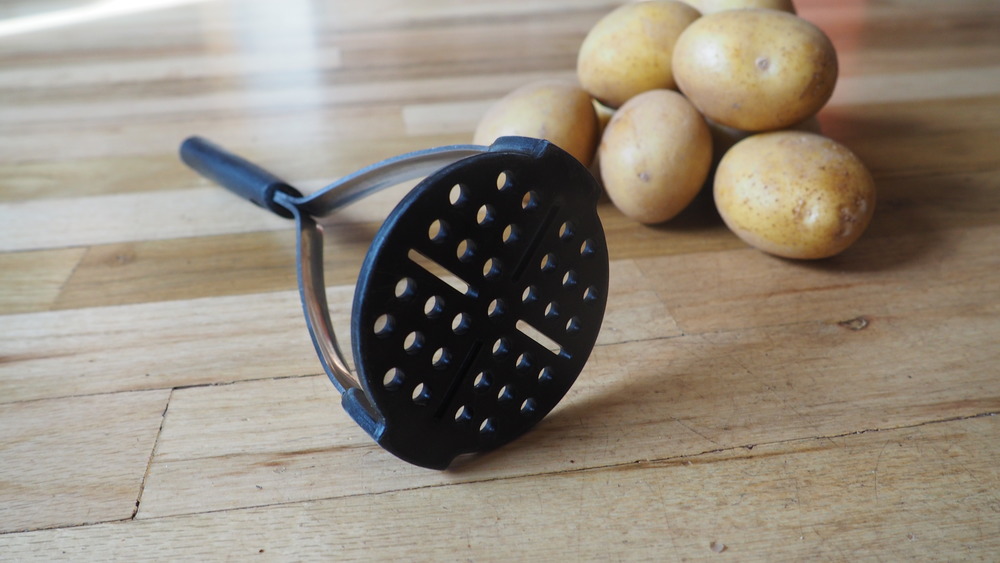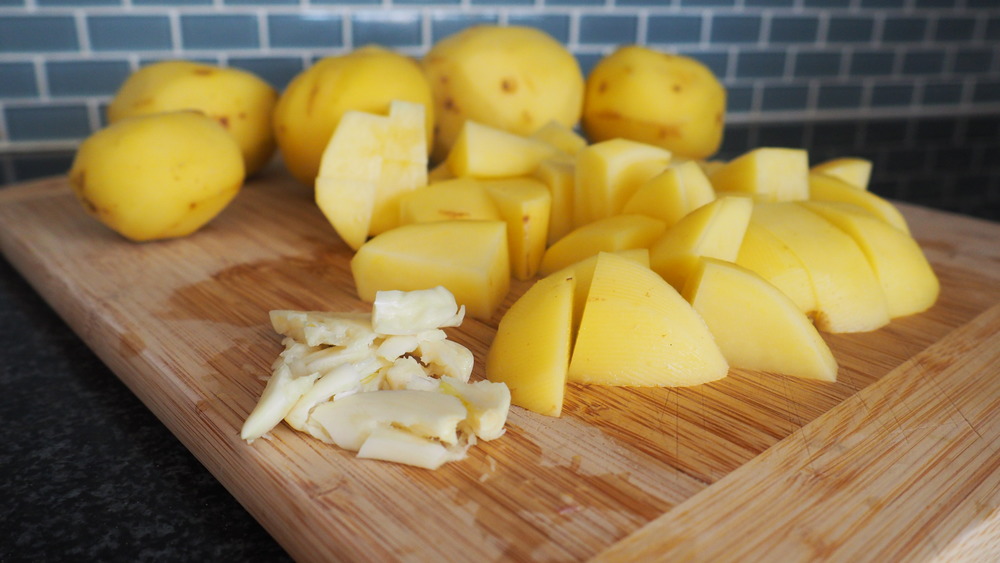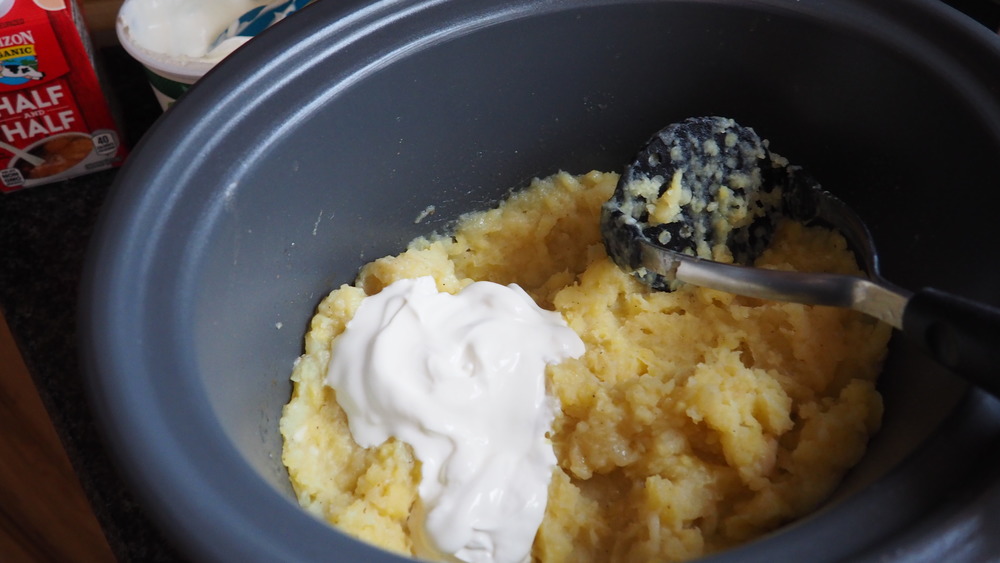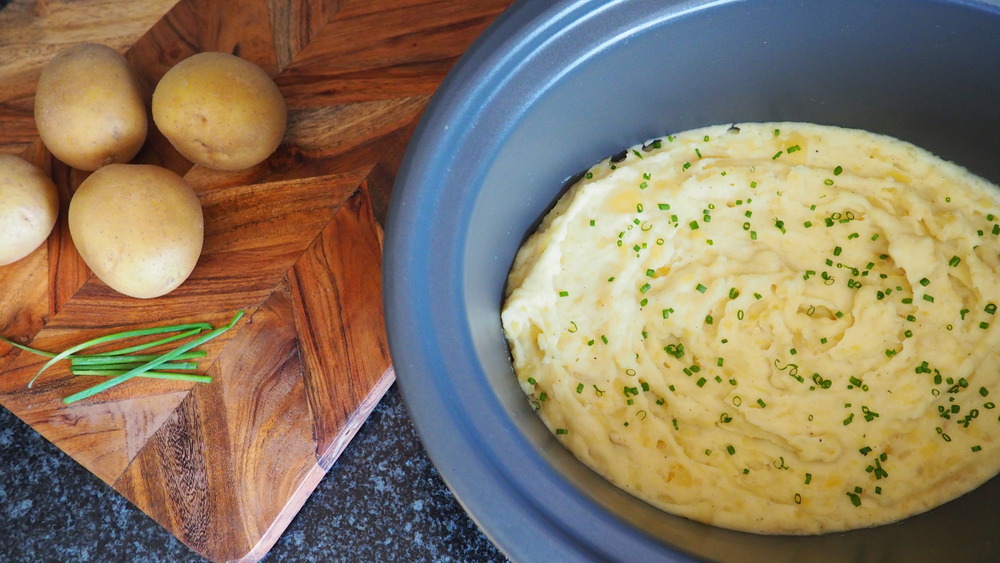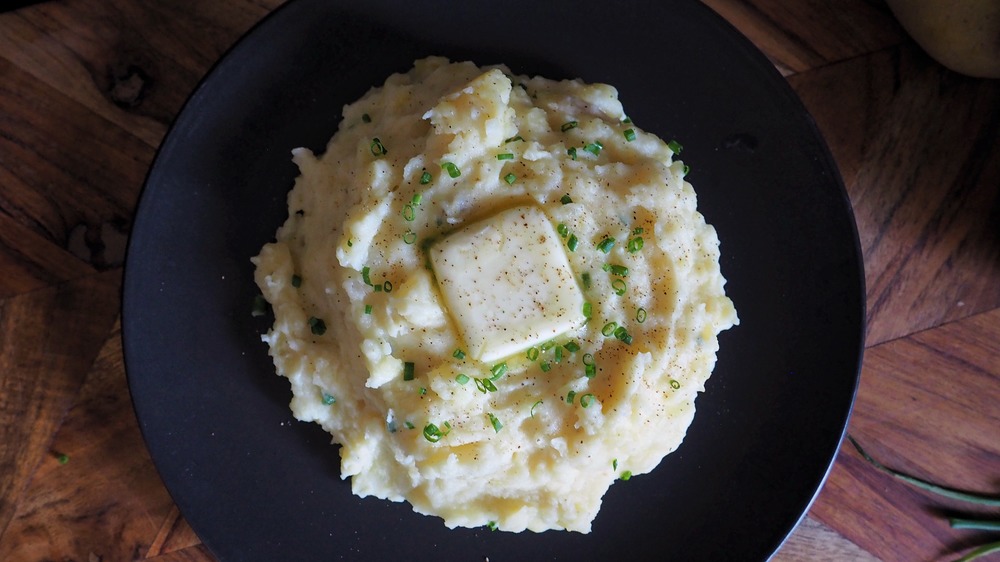Slow Cooker Mashed Potato Recipe
Mashed potatoes are a staple in our house. We serve them alongside meatloaf or pork chops for weeknight dinners, and a gigantic bowl almost always makes an appearance on the table for holiday meals. They're not necessarily difficult to make, but they do throw a wrench in meal prep. You see, mashed potatoes can get thick and gummy as they sit, so we always try to mash them at the last minute. So when we learned we could use a slow cooker to make the process easier, we had to give it a go.
The best part about this slow cooker mashed potato recipe is that you can make it in advance. The potatoes cook in about four hours on the slow cooker's high setting, and you can hold the mashed potatoes in the slow cooker to keep them warm until you're ready to serve. We even found it's possible to make slow cooker mashed potatoes a day ahead of time and reheat them a few hours before dinner.
Gather the ingredients to make slow cooker mashed potatoes
The first thing you'll need to make these slow cooker mashed potatoes are potatoes. It's kind of hard to make a mash without them! We'll talk about the best type of potato for mashed potatoes in a minute, but we used three pounds of Yukon gold potatoes for our test batch. From there, you'll also need a stick of unsalted butter, a half cup of sour cream, and up to a cup of half and half. You can use regular milk if you like, but half and half has a higher fat content, making the potatoes taste richer and creamier.
We could have stopped there, but we added a few extra ingredients to add flavor. Salt and pepper are the best way to season the mashed potatoes, and chives (or green onions, if you can't find chives) make a perfect garnish. The chives not only provide a visual color contrast, but they also add a light onion flavor and a tiny bit of crunch. Finally, we included three smashed garlic cloves to our mashed potatoes. The garlic adds a serious flavor boost to the dish, but feel free to omit it if you're serving picky eaters.
What's the best type of potato for slow cooker mashed potatoes?
There are three types of potatoes: starchy, waxy, and all-purpose. Many people use starchy potatoes (like Idaho or russet potatoes) for mashed potatoes. These potatoes have a low moisture content, so they become light and airy when they're cooked. They're also good at absorbing other flavors like butter and sour cream. Unfortunately, starchy potatoes also oxidize very quickly when they're cut, turning brown unless they're submerged in water.
Since our slow cooker mashed potatoes recipe doesn't use a lot of liquid, we recommend using Yukon gold potatoes instead. These all-purpose potatoes have a naturally buttery flavor, and they're absorbent like starchy potatoes, making them ideal for mashed potatoes. They also won't turn an unpleasant color during the low-and-slow cooking time. If you can't find Yukon gold potatoes, try any other variety of yellow-fleshed potato. Avoid using red-skinned potatoes, which are usually waxy potatoes that will create an overly dense texture when mashed.
How do you make slow cooker mashed potatoes without a masher?
Our favorite method for making slow cooker mashed potatoes involves a potato masher. These utensils either feature a curved wire or a waffle-like round head with a bunch of holes, and they're an easy, handheld way to turn potato chunks into a smooth-ish puree. We say "smooth-ish" here because there are usually some little chunks of potatoes that remain in the mash, giving your mashed potatoes a little texture.
If you don't have a potato masher, try passing the potatoes through a food mill or a potato ricer. In a pinch, you can even use a cooling rack with a grid pattern. Of course, electric options like a stand mixer with a paddle attachment or a handheld electric mixer also work here. Keep in mind that these electric tools are capable of creating smoother mashed potatoes, but they will also be denser. The more you work the potato, the more the starches release, making the mash heavier the longer you work it.
Peel and chop the potatoes to start this slow cooker mashed potato recipe
The first step to making slow cooker mashed potatoes is peeling the potatoes. Some people prefer to leave the skins on, so you can absolutely go that route if you prefer. The skins contain fiber, vitamins, and minerals, but they also make it impossible to create a perfectly smooth mashed potato. Because texture was important to us, we decided to remove the skins.
After peeling the potatoes, cut each one into one and a half-inch chunks. You don't need to stress too much about your knife skills here since no one will ever see the pieces — they'll be mashed by the time they make it to the plate. That said, it is important for the pieces to be roughly the same size so they'll cook evenly. We don't want some potatoes to be overcooked while the others are still raw in the center!
Place the chopped potatoes in the slow cooker along with a few cloves of crushed garlic, some salt and pepper, and a whole stick of butter. It's helpful to cut the butter into several pieces first to help it melt more evenly. Add a cup of water, close the lid, and turn the slow cooker to high. The potatoes should be tender when pierced with a fork in about four hours.
Heat the milk before finishing these slow cooker mashed potatoes
When the potatoes are finished cooking, remove the lid and mash the potatoes using a potato masher (or any of the alternatives we discussed earlier). At first, it might seem like there's too much liquid in the slow cooker, but the potatoes will quickly absorb the buttery water as soon as you start mashing.
To finish the potatoes, add the half and half and sour cream to the potatoes and give them a final mash. Before you do, there's one important step to take first: heating the half and half. It might seem like a silly extra step, but it's critical to creating the right texture. Southern Living explains that cold milk will cool the potatoes down and prevent the starches from fully absorbing the liquid. Instead, warm the half and half in the microwave in 30-second intervals until it's barely steaming. Alternatively, you can use the stovetop and heat the milk over medium heat until it's almost simmering. Add a half cup of the warmed half and half to the potatoes along with the sour cream, and stir the mash until the liquid is absorbed. If the potatoes are dry or too thick, add the remaining half cup of milk.
Before serving, give the potatoes a taste and season them with additional salt and pepper, as needed. Sprinkle the potatoes with chopped chives just before serving.
How long can you keep mashed potatoes in a slow cooker?
Making slow cooker mashed potatoes is not only an easy way to create one-pot mashed potatoes, but the slow cooker also doubles as a way to keep the potatoes warm. You can cook this recipe several hours in advance and hold the potatoes on the warm setting for up to four hours (according to the Kitchn). Just make sure to stir once an hour to keep the bottom layer from browning.
You can also make this slow cooker mashed potato recipe in advance. Cool the mashed potatoes and store them in the fridge for up to five days. Several hours before you're ready to serve, return the mashed potatoes to the slow cooker and heat them on low, stirring a few times to distribute the heat. The Spruce Eats estimates it takes three to four hours to reheat the potatoes using this method. Before serving, add a little extra butter or half and half, and stir until the consistency is just right.
Were our slow cooker mashed potatoes the best mashed potatoes ever?
We're no strangers to using the slow cooker to keep mashed potatoes warm, but cooking mashed potatoes in the slow cooker was a new method for us. It might just be our new favorite way to make mashed potatoes! It was a completely hands-off cooking process: The slow cooker created a gentle heat (even on high), so we didn't feel the need to stir the potatoes or check on them like we do when we boil mashed potatoes. Plus, we were able to use the slow cooker's bowl to cook, mash, and hold the potatoes, so it kept the dishes to a minimum. The flavor of the mashed potatoes was incredible, too. They were so moist, we didn't even need to smother them in gravy (although it's never a bad idea if you have some on hand).
The one drawback of this cooking method is that it creates a ton of mashed potatoes — enough to feed six to eight people. If you're cooking for two, you'll end up with a lot of leftovers. Luckily, there are so many creative ways to use up leftover mashed potatoes. Turn them into pillowy gnocchi, use them to make potato rolls, transform them into croquettes or fritters, or pop them in the waffle iron for a surprisingly delicious treat.
Slow cooker mashed potatoes directions
These potatoes cook in about four hours, and you can hold the mashed potatoes in the slow cooker to keep them warm until you're ready to serve.
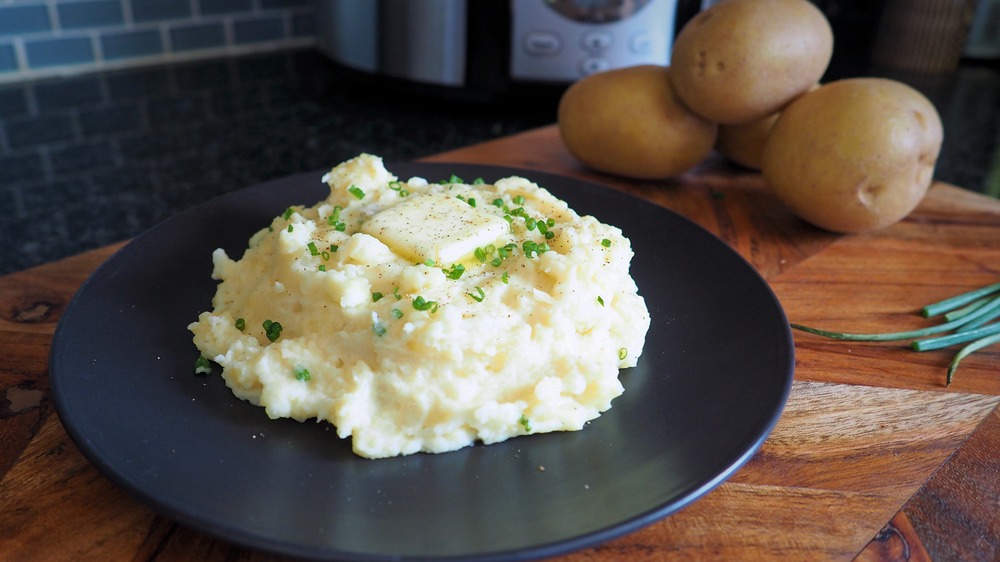
Ingredients
- 3 pounds potatoes
- 3 cloves garlic, smashed
- 1 teaspoon kosher salt
- 1/4 teaspoon ground black pepper
- 1/2 cup (1 stick) unsalted butter, cut into several pieces
- 1 cup water
- 1/2 to 1 cup half and half
- 1/2 cup sour cream
- 2 tablespoons sliced chives, for garnish
Directions
- Peel the potatoes and cut them into 1-1/2 inch chunks.
- Place the chopped potatoes, garlic, salt, ground black pepper, butter, and water in a 6-quart slow cooker. Cover and cook on high for four hours until the potatoes are tender.
- When the potatoes are almost finished, warm the half and half in the microwave in 30 second intervals or on the stovetop over medium heat until the liquid is barely simmering.
- Remove the lid to the slow cooker and mash the potatoes using a potato masher. For a smoother texture and denser consistency, transfer the potatoes to a stand mixer or beat with an electric hand mixer.
- When the potatoes have absorbed the liquid, add the sour cream and 1/2 cup of the warmed half and half, stirring until the liquid is absorbed. If the potatoes are too thick, add the remaining 1/2 cup of half and half.
- Season the mashed potatoes with salt and pepper to taste, and sprinkle the chopped chives on top as a garnish.
Nutrition
| Calories per Serving | 389 |
| Total Fat | 22.8 g |
| Saturated Fat | 14.2 g |
| Trans Fat | 0.6 g |
| Cholesterol | 61.8 mg |
| Total Carbohydrates | 42.1 g |
| Dietary Fiber | 5.1 g |
| Total Sugars | 3.7 g |
| Sodium | 352.5 mg |
| Protein | 6.2 g |
